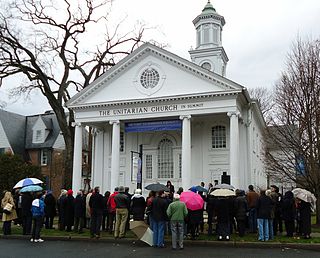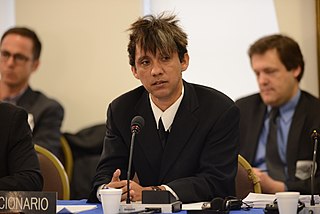"Gay agenda" or "homosexual agenda" is a pejorative term used by sectors of the Christian religious right as a disparaging way to describe the advocacy of cultural acceptance and normalization of non-heterosexual sexual orientations and relationships. The term originated among social conservatives in the United States and has been adopted in nations with active anti-LGBT movements such as Hungary and Uganda.

Unitarian Universalism, as practiced by the Unitarian Universalist Association (UUA), and the Canadian Unitarian Council (CUC), is a non-Creedal and Liberal theological tradition and an LGBTQ affirming denomination.

New Zealand society is generally accepting of lesbian, gay, bisexual, transgender and queer (LGBTQ) peoples. The LGBTQ-friendly environment is epitomised by the fact that there are several members of Parliament who belong to the LGBTQ community, LGBTQ rights are protected by the Human Rights Act, and same-sex couples are able to marry as of 2013. Sex between men was decriminalised in 1986. New Zealand has an active LGBTQ community, with well-attended annual gay pride festivals in most cities.

Lesbian, gay, bisexual, and transgender (LGBT) people in Trinidad and Tobago face legal challenges not experienced by non-LGBTQ residents. Households headed by same-sex couples are not eligible for the same rights and benefits as that of opposite-sex couples.

The Belize National Cricket Association is the national governing body of cricket in Belize, established in 1997. It gained affiliation with the International Cricket Council in 1997, the Belize National Sports Council in 2016, and the Belize Olympic Committee in 2020.

Lesbian, gay, bisexual, and transgender (LGBT) people in Malaysia face severe challenges not experienced by non-LGBT residents. Sodomy is a crime in the country, with laws enforced arbitrarily. Extrajudicial murders of LGBT people have also occurred in the country. There are no Malaysian laws that protect the LGBT community against discrimination and hate crimes. As such, the LGBT demographic in the country are hard to ascertain due to widespread fears from being ostracised and prosecuted, including violence.

Lesbian, gay, bisexual, and transgender (LGBT) people in Guyana face legal and societal challenges not experienced by non-LGBTQ residents. Guyana is the only country in South America, and the only mainland country in the Americas, where homosexual acts, including anal sex and oral sex, are illegal. Cross-dressing was illegal until November 2018, when the statute was struck down by the Caribbean Court of Justice, the court of last resort of Guyana.

Lesbian, gay, bisexual, and transgender (LGBTQ) persons in Belize face legal challenges not experienced by non-LGBT citizens, although attitudes have been changing in recent years. Same-sex sexual activity was decriminalized in Belize in 2016, when the Supreme Court declared Belize's anti-sodomy law unconstitutional. Belize's constitution prohibits discrimination on the basis of sex, which Belizean courts have interpreted to include sexual orientation.

The Women's Issues Network of Belize is a network of organizations in Belize which work towards the empowerment of women, established in 1993. The network currently has 11 member agencies in the country.
Humsafar Trust is an NGO in Mumbai that promotes LGBT rights. Founded by Ashok Row Kavi, Suhail Abbasi, and Sridhar Rangayan in 1994, it is one of the largest and most active of such organisations in India. It provides counselling, advocacy and healthcare to LGBT communities and has helped reduce violence, discrimination and stigma against them. Humsafar Trust is the convenor member of Integrated Network for Sexual Minorities (INFOSEM).

Trans Student Educational Resources (TSER) is a United States-based organization advocating for greater recognition of transgender youth in educational institutions. The organization was founded in 2011 by teen activists Eli Erlick and Alex Sennello and is currently the only national organization led by transgender youth.
galck+, formerly The Gay and Lesbian Coalition of Kenya (GALCK), is the national Sexual Orientation Gender Identity and Expression (SOGIE) umbrella body, representing LGBTQ+ voices across Kenya.

LGBT Foundation is a national charity based in Manchester with a wide portfolio of services. With a history dating back to 1975, it campaigns for a fair and equal society where all lesbian, gay, bisexual and trans (LGBTQ) people are able to reach their full potential. They support over 40,000 people directly every year, and a further 600,000 online. They provide direct services and resources to more LGBT people than any other charity of its kind in the UK.

Lesbian, gay, bisexual and transgender (LGBT) people in Kerala face legal and social difficulties not experienced by non-LGBT persons. However, Kerala has been at the forefront of LGBT issues in India after Tamil Nadu. It became one of the first states in India to establish a welfare policy for the transgender community and in 2016, proposed implementing free gender affirmation surgery through government hospitals. Same-sex sexual activity has been legal since 2018, following the Supreme Court ruling in Navtej Singh Johar v. Union of India. In addition, numerous LGBT-related events have been held across Kerala, including in Kochi and Thiruvananthapuram. However, there is also increasing opposition to LGBT rights recently as evidenced by the anti-LGBT campaigns spearheaded by meninist groups and Muslim organisations like Indian Union Muslim League, Samastha and Jamaat-e-Islami.

Caleb Orozco is an LGBT activist in Belize. He was the chief litigant in a case successfully challenging the anti-sodomy laws of Belize and the co-founder of the only LGBT advocacy group in the country.

Intersex people are born with sex characteristics that "do not fit the typical definitions for male or female bodies". They are substantially more likely to identify as lesbian, gay, bisexual, or transgender (LGBT) than endosex people. According to a study done in Australia of Australian citizens with intersex conditions, participants labeled 'heterosexual' as the most popular single label with the rest being scattered among various other labels. According to another study, an estimated 8.5% to 20% experiencing gender dysphoria. Although many intersex people are heterosexual and cisgender, this overlap and "shared experiences of harm arising from dominant societal sex and gender norms" has led to intersex people often being included under the LGBT umbrella, with the acronym sometimes expanded to LGBTI. Some intersex activists and organisations have criticised this inclusion as distracting from intersex-specific issues such as involuntary medical interventions.
Derricia Castillo-Salazar, also known as Derricia Jael Castillo, is a Belizean military officer, aircraft maintenance officer of the Belize Defence Force (BDF) and LGBT activist. She is the co-founder and president of Our Circle (Belize), an organization dedicated to the inclusion of the LGBT community.

Orozco v Attorney General (2016) 90 WIR 161, also known as Orozco v AG, the Orozco case, or the UNIBAM case, was a landmark case heard by the Supreme Court of Belize, which held that a long-standing buggery statute breached constitutional rights to dignity, equality before the law, freedom of expression, privacy, and non-discrimination on grounds of sex, and which declared the statute null and void to the applicable extent. The decision decriminalised consensual same-sex intercourse for the first time in 127 years, and established that the constitutional right to non-discrimination on grounds of sex extended to sexual orientation.